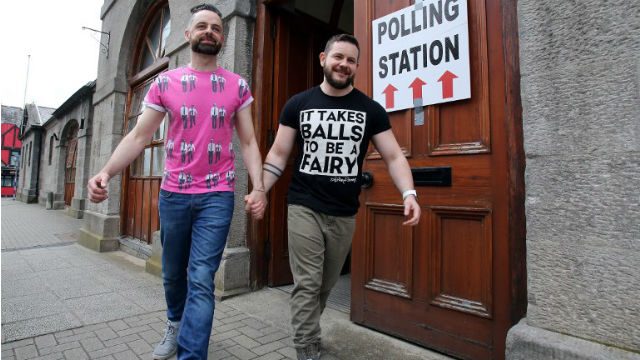SUMMARY
This is AI generated summarization, which may have errors. For context, always refer to the full article.

DUBLIN, Ireland – Ireland went to the polls Friday, May 22, to vote on whether same-sex marriage should become legal, in a referendum that has exposed sharp divisions between communities in this traditionally Catholic nation.
Allowing gay couples to wed would be a seismic change in a country where homosexuality was illegal until 1993, and where abortion remains against the law except where the mother’s life is in danger.
“A lot of my gay friends want to get married. I feel it’s a simple matter of equality,” said Eoghan Bonass, 35, voting in a polling station in the south Dublin suburb of Milltown.
Rachael Stanley, 60, said she voted “No” and felt “strongly about it.”
“This is about children. It’s far too radical a step. I want to protect marriage and the stability of children,” she told Agence France-Presse.
“I hope I don’t get tarred and feathered for saying that,” she added.
If the move is approved and the ensuing legislation is passed, Ireland would become the first country to make the change following a popular vote.
Referendums in Croatia and Slovenia both resulted in “No” votes, although Slovenia’s parliament went ahead and approved gay marriage in March.
“We are saying here, in a world first, that the people of Ireland can extend the right of civil marriage to all our citizens,” Prime Minister Enda Kenny said ahead of the vote.
Church’s historic influence
Ireland would be the 19th country in the world to legalise gay marriage and the 14th in Europe if the referendum passes.
Across the border in Northern Ireland, gay marriage is banned even though it is legal in the rest of the United Kingdom.
All the Republic of Ireland’s main political parties, including conservatives, support amending the constitutional definition of marriage, and the final polls put their camp in the lead.
But the result is by no means certain – the Catholic Church has campaigned strongly for a “No” vote, and many older and rural voters agree with the clergy.
“My voting ‘No’ is not a vote against gay and lesbian people, it’s against changing the definition of marriage,” the Archbishop of Dublin, Diarmuid Martin, told RTE state television on Wednesday.
“I think you can have equality while recognising difference.”
The majority of Irish people identify themselves as Catholic, but the Church’s influence has waned amid growing secularisation and after a wave of child sex abuse scandals that badly discredited the hierarchy.
Jodie Boylan, a 41-year-old voter, said she was too excited to sleep last night.
“It’s a historic day for Ireland. After all we’ve been through with the Church and everything else what a message it would be to send that we are all equal and can be treated the same.”
“I really hope it passes,” she said.
Heated campaign
Polls close at 10:00 pm local time, with the final result not expected until Saturday afternoon.
Voters are being asked whether or not to add an article to the Irish constitution saying: “Marriage may be contracted in accordance with law by two persons without distinction as to their sex.”
Around Dublin, lamp-posts were festooned with placards for the Yes and No camps. Many people were walking round the city centre with stickers on their coats saying they had voted, with many also wearing white stickers reading ‘Yes’ in either English or Irish.
On O’Connell Street, Dublin’s main thoroughfare, a giant ‘Yes’ banner hung down above an amusement arcade, reading: “Vote Yes because marriage matters.”
And overlooking the south side of O’Connell Bridge, the main crossing over the River Liffey, the letters Y E S could be seen in the windows, next to a red heart.
But down on the street, there were placards reading “Don’t be silenced. Vote No”, while there are other “No” placards showing a mother and father kissing a baby, or reading “Two men can’t replace a mother’s love”.
The “Yes” side has been boosted by the support of sports, music and film stars including Irish Hollywood A-lister Colin Farrell and U2 frontman Bono.
Three opinion polls last weekend showed support for same-sex marriage ranging from 53 to 69 percent, while the “No” vote is hovering between 24 and 26 percent. – Rappler.com
Add a comment
How does this make you feel?
There are no comments yet. Add your comment to start the conversation.